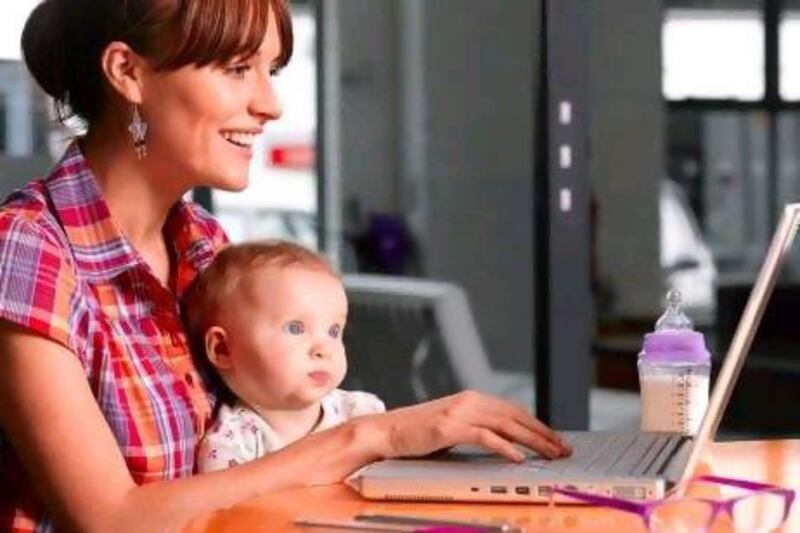Are parents guilty of oversharing their children's lives via social media? Patricia Carswell reports
In the past week I’ve been treated to details of one child’s bowel movements, another’s fear of social situations and a third’s deteriorating manners. There’s nothing unusual in this – except that I have never met these children and I only vaguely know their parents. They have all been Facebook status updates or blog entries.
Parents worry endlessly about what their children are divulging online, but many of us are surprisingly careless ourselves. Happy sixth birthday, Abigail, we post, inadvertently revealing our child’s name and date of birth … and then share a series of photos that one day will make her cringe.
The reason for our carelessness may be that in talking about our children, we are simply doing what we have always done, albeit in a different format. As Naeema Jiwani, a licensed child development psychologist and consultant at the Human Relations Institute in Dubai, says: "In the past, parents would carry around pictures of their children in their wallets or purses and show them off to anyone and everyone. Today the mode has changed, but the essence very much remains the same. Today it's on their phones, their Facebook profile pages or other social networking sites, but the aim is to share with their friends and -family."
Many of us also rely heavily on social networking to keep in touch with our families.
As Lindsay Moran, 45, originally from New Zealand, says: Keeping in touch with home is so much better with Facebook. No one ever gives you the minutiae of life in a letter or phone call. It is the little, everyday things that you’d know about if you were talking or seeing people every week that you truly miss the most, and that helps you keep in touch with folk back home.
Knowing where to draw the line, however, can be tricky. Moran runs separate Facebook accounts – one exclusively for friends and family and another for acquaintances, and only shares personal details about her 7-year-old son on her friends and family page. That said, she admits, I know I overshare at times, forgetting that Facebook isn’t my own personal space. The issue of oversharing is also a concern for the increasing number of parents who blog about their family lives.
One Dubai-based mother, who writes a popular blog about expatriate family life under the pseudonym Dubaiunveiled (www.dubaiunveiled.wordpress.com), finds that not using her real name gives her children, ages 6 and 4, a level of privacy; only close family and friends know her identity. Even so, she’s not always sure she gets it right. In terms of the stories I tell about them, I’m really aware that this breaches their privacy, she says. My oldest son, for example, who is still into toilet humour, thinks he is going to marry a toilet and I’m sure he’ll be mortified about this when he’s 18. There’s a big risk that when they’re older they’ll say to me: ‘Mum, why did you tell everyone that?’ I try really hard to balance it out, so if, on a not-so-good day, I’ve written a post about bad behaviour, I’ll follow it up with a positive post a few days later. If everyone else is talking openly about their children online, though, does it matter if we occasionally cross the line?
Jiwani believes that it does.
A child should never face a situation where they feel ashamed of what their parents put up as they move through high school, university or even in their future professional lives, she says. Parents who expose their children’s whereabouts, developmental milestones and tiny details of their lives also may face the risk of developing ‘closeted children’, who behave in the reverse of their parents’ tendencies and become extremely -secretive.
Tony Neale, the chief executive of Get Safe Online (www.getsafeonline.org), also sounds a note of caution. The nature of social networking means that it carries a degree of risk including becoming a target for cyber--criminals. Many parents, he says, are not sufficiently acquainted with the privacy settings on social networking sites. Although most parents are aware that privacy settings exist, not everyone knows how to make the best use of them. We would encourage parents to really do their research.
Tony Neale's top tips for safe social networking
Consider your child’s feelings and be certain that they would be comfortable with you sharing pictures of them with your network. What goes online stays online so never say anything or publish pictures that might later cause you or your child embarrassment.
Be wary of publishing any identifying information about your child, either in your profile or in your posts – such as phone numbers, pictures of their school, their address or birthday. Giving away too much personal information may open your children up to risks including bullying and scams.
Have an open dialogue with your children about the issues surrounding being online and the way both adults and children can protect themselves.
Learn how to use each social networking site properly and use the privacy features to restrict strangers’ access to your profile. Be guarded about who you let join your network.





